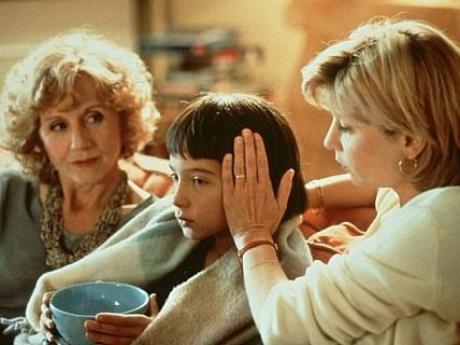Alain Berliner’s Ma Vie En Rose (My Life in Pink) is a touching story about a young boy who prefers dressing up as a girl. The sensitive film traces the upheavals in the life of the Fabre family, who struggle to understand their seven-year-old son, Ludovic, and his penchant for wearing clothes that are stereotypically for females.
My life in Pink opens with the Fabre family moving into a new house after the father, Pierre, gets a different job. As Ludovic appears at a party dressed in high heels and makeup, his mother, Hanna, hurriedly attempts to cover it up and the couple laughs it off as a joke. They usually view their son’s cross-dressing with a mixture of shame which they channel into the pretence that it is a child’s game. Ludo, blissfully unaware of the structural constraints in his way, declares ‘I’m a boy now, but one day I’ll be a girl”, much to his parents’ dismay. His ‘ignorance’ of societal binaries is particularly heart wrenching, as he does not seem to understand that there is more to being a girl than simply wanting to be a girl. Which begs the question – why should it be more complex than simple desire? Disturbed by their son’s behaviour, Hanna takes him to a child psychologist and Pierre drags him off to football practices.
unable to understand this young child who does not stick to prescribed norms, People label him deviant and seek to protect their own children from his influence, believing it will spread by association.
Ludovic’s journey becomes more complex when he befriends Jérôme, the son of his father’s boss. They innocently decide to get married and while at Jérôme’s house, Ludo enters his sister’s room and dons one of her dresses, unaware that she is deceased. When Jérôme’s mother comes upon the scene, she is horrified and Jérôme’s father throws a fit. Tensions continue to rise in the Fabre family, and Ludo looks at the Barbie figures of Pam and Ken, from a popular TV show he watches, as his guardian angels.
Also read: Astitva Movie Review: Reclaiming An Identity Of Our Own
When Ludovic steps in as Snow White in the school play, the parents at the school sign a petition to have him expelled. Unable to understand this young child who does not stick to prescribed norms, people label him deviant and seek to protect their own children from his influence, believing it will spread by association. As the situation becomes progressively worse, Ludo attempts suicide by hiding in the freezer, but luckily Hanna finds him in time.
Pierre and Hanna let Ludo wear a skirt to a neighbourhood party. The next day Pierre gets fired and the Fabre house is vandalised with graffiti, causing him to break down. Hanna lashes out at Ludo and cuts his hair to a much shorter length, akin to that of his brothers. This heartbreaking scene fills Ludovic with resentment and he decides to live with his more accepting grandmother.
A little while later, after Pierre gets a new job and they move into a new neighbourhood, Ludo comes back to stay with the Fabre family. He gets invited to his neighbour Christine’s party and he goes dressed as a musketeer. Chris, who prefers to wear boy’s clothes, unhappy with her own Princess costume, uses her friends to pressurise Ludo into swapping costumes with her. Hanna, on seeing Ludovic loses her cool, hits him repetitively till he runs away. Christine confesses that she forced Ludo into exchanging costumes and her mother asks Hanna what the problem was with this.
It pertinently brings out how an individual’s choices can affect the familial collective.
The movie concludes with Hanna accepting Ludo for who he is and Pierre even conceding that he can wear as many skirts as he likes. Whether Ludo simply liked to dress as a girl, or grew up and wished to identify as one, is left open. The idea was just to point out that gender is fluid and gender identity does not need to be based on a binary. It is a continually evolving idea that one can interpret according to what makes them happy.
The film effectively deals with the confusion a child faces and the lengths people will go to in order to ensure he fits the desired mould. It pertinently brings out how an individual’s choices can affect the familial collective – Ludo’s behaviour gets his father fired and his house vandalised, signifying that society blames his family for his supposed transgressions and punishes him through them to bring him into line. In the end, Ma Vie en Rose is a story of autonomy – the independence Ludo, or anyone else, should have in deciding who they are, free from gender constructs that were forcing them into stereotypes. The debate on sex and gender is dealt with realistically in this beautiful piece, which is in equal parts optimistic and disturbing.
Also read: ‘Boy Erased’ And ‘The Miseducation Of Cameron Post’ Show The Horrors Of Gay Conversion Therapy
Pierre and Hanna’s evolution depicts how parents can become support structures and society itself can be accepting of contestations to the prescribed ‘normal’. The open-ended ending is a remarkable achievement of the film, which decides it is not necessary to know what Ludo will choose to identify as, if at all he chooses to identify with anything. It preempts any conclusions and that is its biggest takeaway – it simply discusses congruence between mind and body that one must find for oneself, without owing any outside agency explanations.
Featured Image Source: Derek Winnert
About the author(s)
Pallavi is a second year Political Science student struggling to graduate and her tumultuous relationship with her dog pushed her towards writing. She is an ardent lover of history who is trying to get rid of the internalized labels she grew up with.



